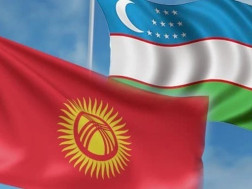Russia is effectively driving out Kazakhstan from the Uzbekistani oil market, Kursiv media reports with reference to Vedomosti, a Russian business newspaper.
«Over the period from January to June 2023, Kazakhstan exported 23,900 tons of oil and about 10,000 tons of gas condensate to Uzbekistan by railway. This was the lowest rate of oil export over the entire history on record (no details about the timeline available), according to a survey by Argus. The State Customs Committee of the Republic of Uzbekistan confirms the negative dynamic of supply, although the figures aren’t necessarily the same. According to the agency, over the first six months of the year, Kazakhstan’s oil supply decreased threefold year-on-year to 36,400 tons,» the media outlet reported.
At the same time, an anonymous trader pointed out the increase in the supply of cheap Russian oil to Uzbekistan. The Russian oil exports increased this year thanks to Gazprom Neft, which in March started consolidated shipments of oil to Uzbekistan through pipelines controlled by the Russian Transneft and KazTransOil, a national pipeline company in Kazakhstan.
As a result, the transit of Russian oil to the Fergana refinery, which has a capacity of 5.5 million tons of oil per year, through the territory of Kazakhstan grew fourfold in Q2 compared to Q1 and reached 37,900 tons.
Part of these exports were carried by railways. In the first half of this year, Russian export of oil and oil products to Uzbekistan via railways grew to 1.2 million tons, a 5.2-time increase over the same period last year. However, as Alexander Slobodyanik, head of the freight shipment research department of the Institute for Natural Monopolies Research, noted, crude oil accounts for only 0.6% of these exports, while gasoline and heating oil account for 28% and 20.8%, respectively.
Russian oil is usually exported by a pipeline from Omsk to Pavlodar and then to Shymkent where oil is loaded into railway cisterns at the Shagyr railway station and then exported to Uzbekistan by railway.
At the beginning of this year, Russia agreed to supply Uzbekistan with 300,000 tons of oil. In March, KazTransOil reported that it would transport 250,000 tons of Russian oil to Uzbekistan, although in August this forecast was revised downward to 180,000 tons. Over the first six months of 2023, Uzbekistan received 48,500 tons of Russian oil and will receive an additional 131,500 tons by the end of this year.
Export of Russian oil surged when Kazakhstan decided to separate its oil from Russia’s and trade it with premium to the Urals brand. (Kazakhstani oil used to be sold under this oil brand similar to Russian oil.) After the full-scale Russian invasion of Ukraine in 2022, Western countries have imposed sanctions against Russia that put pressure on Kazakhstani oil exported through Russian pipelines. Its price was traded with a discount of up to $30 to $35 per barrel compared to the Brent benchmark. That is why Kazakhstani oil was renamed Kebco (Kazakh Export Blend Crude Oil) and has become more expensive than Urals.
On October 6, Russia and Uzbekistan signed an agreement to expand their cooperation in the sphere of oil and oil products supply via railways. The document was signed after President Vladimir Putin of Russia and President of Uzbekistan Shavkat Mirziyoyev negotiated the issue in Moscow. No details were provided, though.
KazTransOil planned to transport 250,000 tons of oil to Uzbekistan this year, including 25,000 in March. However, it managed to transport only 10,700 tons of oil in March and 38,000 tons in the entire Q2.
Russia started exporting its oil to Uzbekistan in 2017 when it supplied 67,900 tons. In 2018, the transit of Russian oil through Kazakhstan was 36,000 tons. Over the period from 2019 to 2022, there was no transit at all.
On July 10, 2023, KazTransOil introduced a new tariff to keep Russian oil going to Uzbekistan in its reservoirs at $0.52 per ton a month. The previous tariff was nominated in the tenge (233.76 per ton a month, VAT excluded). Interestingly, if calculated in the tenge, the new tariff is equal to 232.26 tenge, which is slightly less than the previous rate. However, if the national currency of Kazakhstan continues to lose its value compared to the U.S. dollar in the middle term, the new tariff in USD will boost the revenue nominated in the tenge. In other words, the move can be reckoned as a proactive measure to mitigate possible devaluation’s impact on KazTransOil revenue.
















